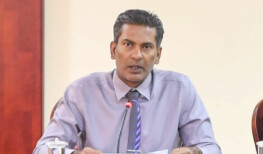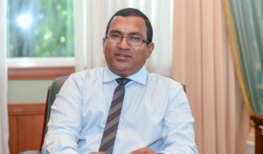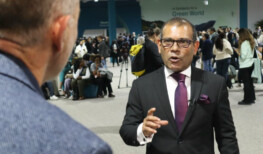Op-Ed: Golden Years, Stronger Care — Supporting Maldives’ Seniors with Dignity
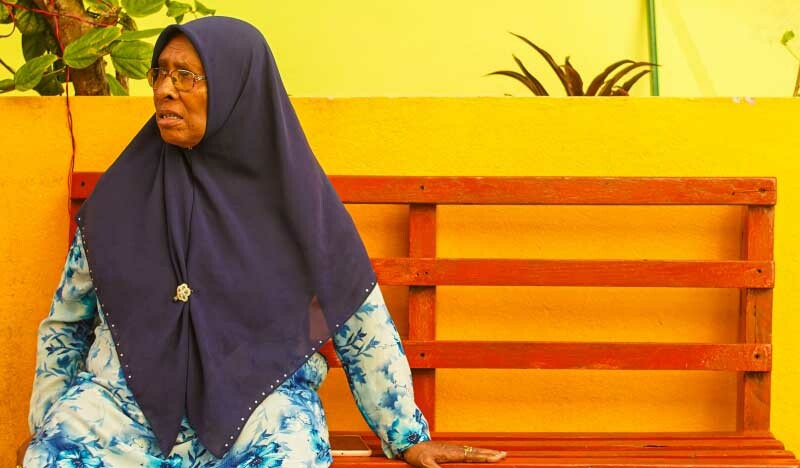
Photo: UNFPA Maldives / Sikundi Corporation
Written by: United Nations Population Fund and Maldives Bureau of Statistics
Every 1st of October, the world celebrates the International Day of Older Persons to honour the elderly. This year’s theme, “Ageing with Dignity: The Importance of Strengthening Care and Support Systems for Older Persons Worldwide,” underscores the need for more robust support systems for seniors.
In the Maldives, this day highlights the increasing longevity of the population. Over the past two decades, the Maldivian life expectancy at birth has risen by more than 20 years. With improvements in healthcare and lower mortality rates, the country is transitioning into an ageing society. Currently, one in every twenty Maldivian is over the age of 65 and by 2050, this figure is projected to rise to one in eight.
Meanwhile, many young people are completing ten years of schooling and an increasing number are graduating from universities. Coupled with declining birth rates, these developments have slowed the population growth and reduced family sizes. These demographic shifts are significantly impacting the country’s economic and social service sectors.
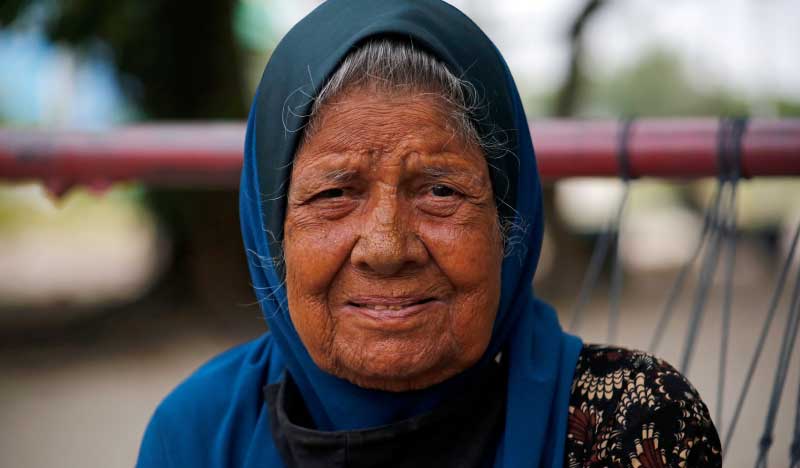
© UNFPA Maldives / Ashwa Faheem
The healthcare system in the Maldives has expanded across the country, with specialist medical services now available at the atoll level and tertiary care consistently available in Greater Malé, where 41% of the population resides. However, there remains a heavy reliance on foreign medical professionals, resulting in high turnover and challenges in maintaining consistent care throughout the country. At the same time, preventive and public health services have declined over the years.
Elderly, child and sick care is predominantly carried out by women and remains largely home-based. The dispersed population—where 70% of islands have fewer than 1,000 residents—makes organising specialist care services particularly difficult and costly, despite universal health insurance.
Moreover, many families and young people are migrating to the highly urbanised Greater Malé area, leaving behind an ageing population on the islands. This shift further complicates care for the elderly, who are often left isolated.
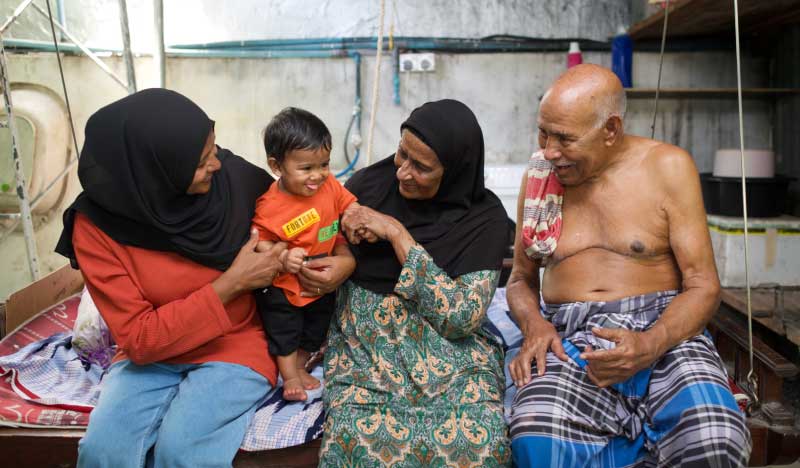
© UNFPA Maldives / Shaari
In 2020, there were 17 older persons for every 100 children. By 2054, this ratio is projected to shift dramatically, with 91 older persons for every 100 children. These demographic transitions will greatly impact housing, care work and labour management. Currently, almost 43 per cent of the labour force comprises foreigners, and less than half of the female population is engaged in the formal economy. Women predominantly undertake care services and participate in informal economic work.
Rapid urbanisation, the shift from extended to nuclear families and the fact that 22% of children live with single parents make it nearly impossible for women to significantly increase their participation in the formal labour force. This is evident from the minimal gain in female labour force participation over the past seven years. Without community support for affordable childcare and systems fostering intergenerational solidarity, the Maldives may struggle to sustain its progress.
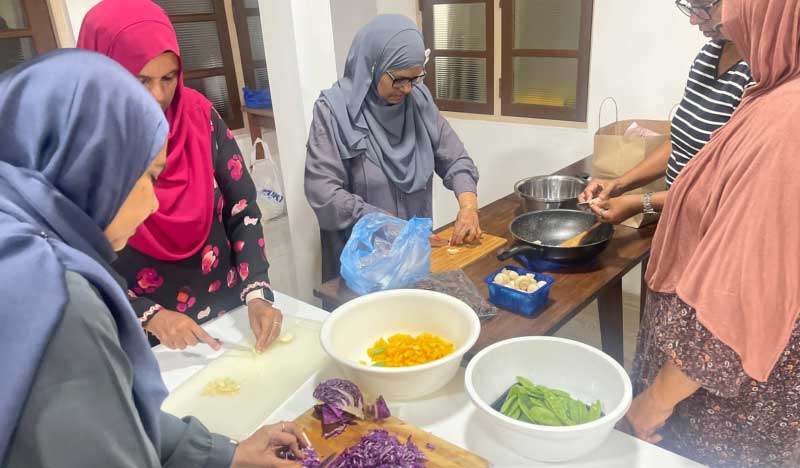
© UNFPA Maldives
The role of government in promoting active and healthy ageing is crucial, but it cannot be the sole entity responsible for addressing these complex issues. A multifaceted approach involving various stakeholders is essential for fostering an environment conducive to healthy ageing.
The current national development model emphasises individuals primarily as economic agents—producers, consumers, reproducers and taxpayers. This perspective tends to limit the understanding of human potential to economic contributions alone.
To effectively promote active and healthy ageing, there needs to be a paradigm shift. Instead of viewing individuals solely through an economic lens, we should recognise them as holistic beings with diverse roles: healthy, skilled workers, nurturing mothers and fathers, supportive partners, lifelong learners and engaged citizens.
This shift requires empowering individuals to realise their hopes and aspirations. By focusing on personal development and community engagement, we can create a society where people are not only economically productive but also socially connected and fulfilled.
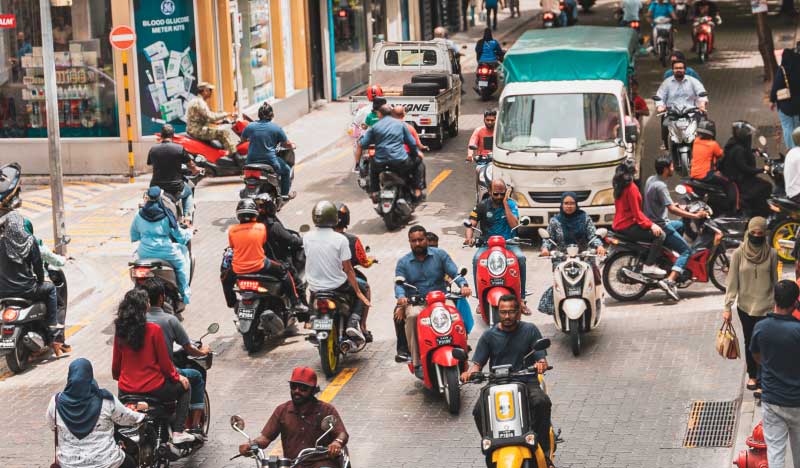
© UNFPA Maldives / Loopcraft
As a Small Island Developing State, the Maldives faces challenges due to its limited landmass. Forty one percent of the population lives in the densely packed Greater Malé region, with high population density. The environment is crucial for promoting active ageing, yet public spaces are scarce. In a society of single-unit households, the government must prioritise road safety and security to support ageing with dignity.
Currently, over half of the streets and almost all open spaces are used for vehicle parking, leaving limited parks and creating unsafe areas for older people to move freely. As a result, many older adults in urban areas are confined indoors, isolating them from family, friends, and the wider community.
In the Maldives, the retirement age is 65, leaving around 15 years to live up to the average life expectancy. However, due to urban development, many retirees face limited options for staying active, often leading to health issues, including mental health decline. In a rapidly ageing nation, this could result in significant social costs unless proactive planning is implemented. With the increase in non-communicable diseases, by the age of 40, most people suffer from long-term health conditions, resulting in half of their lifespan being spent with a disease. The increase in life expectancy has health consequences for the population, with the current trajectory being unsustainable for the government.
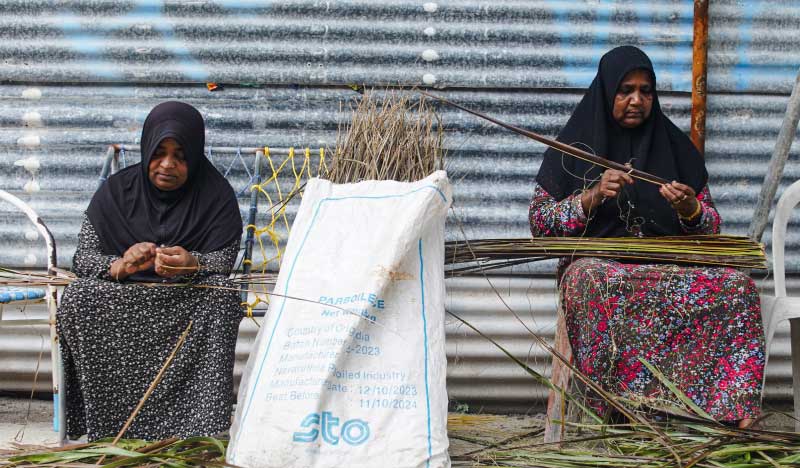
© UNFPA Maldives / Sikundi Corporation
Decisions made outside the health sector significantly impact healthy and active ageing, making this a complex challenge. Food systems, spatial planning and housing are at the heart of care systems, yet policies made in isolation often fail to address these interconnected needs. If we start planning for ageing only at 65, the social sector will be overwhelmed. However, by focusing on the entire life course—starting from the first 1,000 days—we can build a society that supports ageing with health, dignity and purpose.
Considering that the majority of inhabited islands have fewer than 1,000 residents, it’s unrealistic to expect these islands to sustain the same infrastructure as Greater Malé. When young people migrate, the elderly and children are often left behind. Ten islands already have a mean age close to 40. Applying the same retirement principles in this context would require forced international migration just to keep the system running. Instead, by empowering seniors through lifelong learning and adapting the system to meet local needs, we can engage the entire community and ensure that islands function effectively.
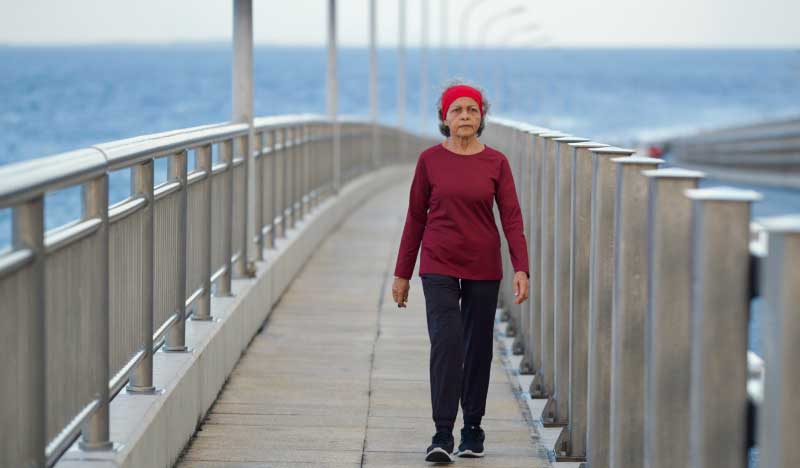
© UNFPA Maldives / Shaari
While significant progress has been made in providing universal healthcare, basic pensions and social welfare programs to prevent older people from falling into poverty, sustaining these achievements during a demographic transition requires a shift in approach. For example, the emphasis on ten years of secondary education must evolve into lifelong learning to keep pace with advancements in digital technologies. Traditional approaches to digital literacy are no longer sufficient. Additionally, as the demand for care work increases, it is crucial to prioritise primary prevention and promote active and healthy ageing to reduce future care needs.
There are no shortcuts to addressing population ageing. Encouraging women to have more children is not the answer, as those children will face the challenges of a warmer climate, higher living costs, and the complexities of the modern world. It’s unfair to place the burden on the younger generation without first adapting to these changing realities. Instead of reactive or punitive measures, future-proof policies must be human rights-based and people-centred, requiring a reimagining of society and the economy.
In conclusion, while government initiatives are vital in promoting active and healthy ageing, a broader approach that recognises the multifaceted nature of individuals is necessary. By fostering environments that support personal growth and community involvement, we can better address the challenges associated with ageing populations. Ideally, these solutions must be island-friendly.
This Op-Ed is jointly developed by the United Nations Population Fund and the Maldives Bureau of Statistics to highlight the challenges and opportunities in preparing for an ageing society.





